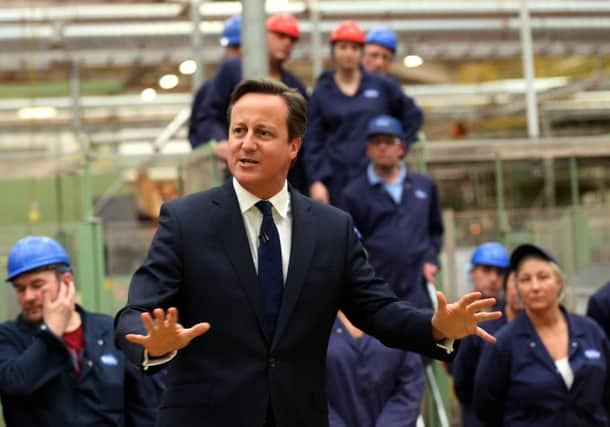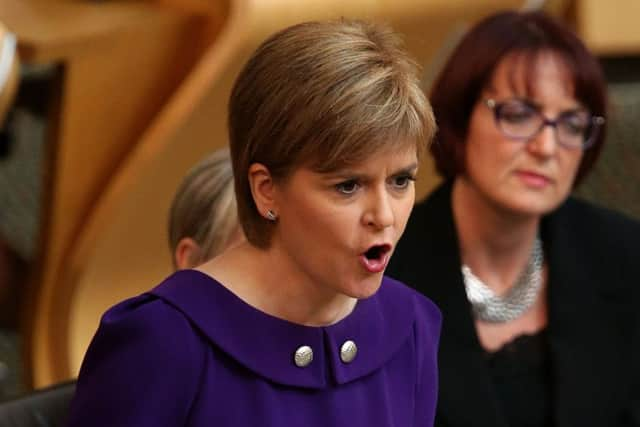Cameron faces crunch talks with Nicola Sturgeon


The Conservative leader will hold showdown talks with Nicola Sturgeon in Edinburgh today where she will demand significantly increased powers for the Scottish Parliament and an end to austerity cuts in Scotland.
The First Minister said she expects a “serious and substantial” meeting with Mr Cameron, who must recognise the SNP’s new “democratic mandate”.
Advertisement
Hide AdAdvertisement
Hide AdThis comes after a cross-party group of MSPs found yesterday that the current UK Government plans for more devolution fall short of the “spirit and substance” of the post-referendum Smith Commission which set out a range of extra powers for Holyrood. Mr Cameron will today set out how his new Tory majority administration will “remain true to its promise” to implement the Smith Commission powers quickly and in full.


And he will call for a shift “beyond the debate about processes” and recognise the strength which comes from “pulling together for the common good”.
“This is our one-nation agenda in action,” he added.
The SNP has warned it can no longer be “business as usual” for Scotland after taking 56 of Scotland’s 59 Westminster seats in last week’s general election.
But Mr Cameron says his visit north aims to underline his “commitment to our United Kingdom and Scotland’s important place in it”.
The Prime Minister added: “That means remaining true to the promise we made to implement the all-party Smith agreement to make Scotland one of the most accountable and powerful devolved parliaments in the world.
“It also means recognising those things which unite us in these islands: the achievements we have made together, the institutions we have built together, our great social history, the common economic challenges we face, and the strength which comes from pulling together for the common good in the future.”
He added: “Scotland has two governments and it is the duty of the First Minister and myself to respect each other’s roles and responsibilities and to work together for the benefit of all the people of Scotland.
“As more powers are devolved to Scotland, it is time to move beyond the debate about processes and focus on those bread and butter issues that affect every family in our United Kingdom – jobs, homes, good schools and strong public services, and dignity and respect in retirement.
Advertisement
Hide AdAdvertisement
Hide Ad“These are the building blocks we need to provide a brighter future for every part of our country.”
Ms Sturgeon described last week’s election result as a “historic shift” in the UK political landscape. It saw the SNP jump from just six to 56 MPs and secure half the popular vote in Scotland, while Labour lost 40 of its 41 seats in Scotland. Mr Cameron remained in Downing Street with 331 MPs.
The First Minister wants to see Holyrood handed control of powers over employment policy “as a matter of priority”, including the minimum wage, welfare, business taxes, national insurance and equality policy. An end to austerity in Scotland is also a key demand of the SNP.
Senior Nationalists have even warned that a failure to listen to Scotland’s voice in the changed political landscape could hasten another independence referendum on the issue.
Ms Sturgeon said: “I am looking forward to serious and substantial talks with the Prime Minister. We will take forward a constructive and co-operative approach in our dealings with the UK Government.
“But, as I have made clear, the election result last week, and the overwhelming mandate that has given the SNP, means that it cannot be business as usual when it comes to Westminster’s attitude to Scotland – whether on public spending or on more powers for Scotland.
“The proposals of the Smith Commission are a good starting point, but the election result shows that people across Scotland are keen to move beyond the extra powers it identified.”
Ms Sturgeon and Deputy First Minister John Swinney met the STUC this week at which a memorandum of understanding was agreed, setting out “serious concerns” over the impact of continued austerity on Scots after the Tory victory, as well as an additional £12 billion of cuts to social security spending and further erosion of trade union and employment rights.
Advertisement
Hide AdAdvertisement
Hide AdIt also called for the UK Government to agree to the full devolution of powers over the minimum wage, trade union and employment law, health and safety law and equalities legislation, and further devolution of powers over social security.
Ms Sturgeon says this shows the “depth of support” within civic Scotland for substantial new powers for Holyrood. She added: “Scotland expects these powers to be delivered – and I expect the Prime Minister to recognise the democratic mandate that now exists to deliver them.”
Holyrood’s devolution (further powers) committee warned yesterday the proposals set out for additional Holyrood powers by the UK Government do not meet the “spirit or substance” of the recommendations originally set out by Lord Smith.
Concerns were also raised over proposals for more welfare, income tax, the fiscal framework and Parliamentary oversight in a report by the committee. The new Scottish Secretary, David Mundell, is now being urged to reflect on the concerns highlighted during the inquiry.
Nationalist committee convener Bruce Crawford said: “The committee believes the current proposals do not yet meet the challenge of fully translating the agreement reached in the Smith Commission into legislation.
“For example, there is no power for the Scottish Parliament to top up reserved benefits despite that being one of the powers highlighted.
“The committee also seeks reassurance that any new benefits or top-up benefits introduced in Scotland would result in additional income for a recipient.
“The committee is disappointed that the currently proposed legislation sells Smith short.”
Advertisement
Hide AdAdvertisement
Hide AdOn welfare, the report says that the Scottish Parliament should have the power to create new benefits in areas of devolved responsibility and new powers to make “discretionary” payments in any area without permission from Westminster.
Scotland would get full control over income tax rates and bands, but the committee warns there are “significant issues” over the definition of residency for a Scots taxpayer and the need to avoid double taxation.
Conservative MSP Alex Johnstone said the draft clauses are “imperfect” and lack clarity on benefits and welfare.
Liberal Democrat Tavish Scott, who sat on the Smith Commission, has demanded the new Tory government put the full intent of Smith into law.